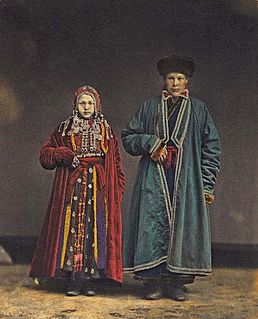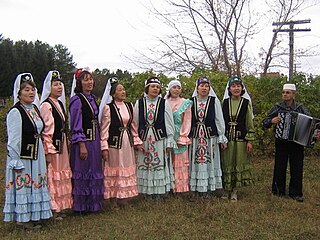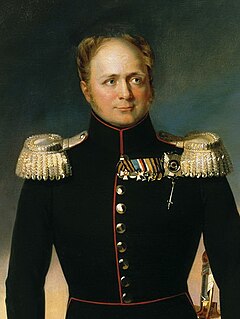
The Bashkirs are a Turkic ethnic group, indigenous to Bashkortostan and to the historical region of Badzhgard, extending on both sides of the Ural Mountains, in the area where Eastern Europe meets North Asia. Smaller communities of Bashkirs also live in the Republic of Tatarstan, Perm Krai, Chelyabinsk, Orenburg, Tyumen, Sverdlovsk, Kurgan Oblasts and other regions of Russia, as well as in Kazakhstan and other countries.

The Orenburg Cossack Host was a part of the Cossack population in pre-revolutionary Russia, located in the Orenburg province.

Islam in Russia is the nation's second most widely professed religion. According to a nationwide survey conducted in 2012, Muslims in Russia numbered 9,400,000 or 6.5% of the total population. However, the populations of two federal subjects with Islamic majorities were not surveyed due to social unrest, which together had a population of nearly 2 million, namely Chechnya and Ingushetia, thus the total number of Muslims may be larger. Among these Muslims, 6,700,000 or 4.6% of the total population of Russia were not affiliated with any Islamic schools and branches. Recognized under the law and by Russian political leaders as one of Russia's traditional religions, Islam is a part of Russian historical heritage, and is subsidized by the Russian government. The position of Islam as a major Russian religion, alongside Orthodox Christianity, dates from the time of Catherine the Great, who sponsored Islamic clerics and scholarship through the Orenburg Assembly.

Islam is the largest religion practiced in Kazakhstan, with estimates of between 47% to 70.2% of the country's population being Muslim. Ethnic Kazakhs are predominantly Sunni Muslims of the Hanafi school. There are also small number of Shia and few Ahmadi. Geographically speaking, Kazakhstan is the northernmost Muslim-majority country in the world. Kazakhs make up over half of the total population, and other ethnic groups of Muslim background include Uzbeks, Uyghurs and Tatars. Islam first arrived on the southern edges of the region in the 8th century from Arabs.

Russian Turkestan was the western part of Turkestan within the Russian Empire, comprising the oasis region to the south of the Kazakh Steppe, but not the protectorates of the Emirate of Bukhara and the Khanate of Khiva.

Siberian Tatars, the indigenous Tatar population of the forests and steppes of South Siberia, originate in areas stretching from somewhat east of the Ural Mountains to the Yenisei River in Russia. The Siberian Tatars call themselves Yerle Qalyq, to distinguish themselves from more recent Volga Tatar immigrants to the region.

Ural Economic Region is one of twelve economic regions of Russia. This prominent industrial region consists of the following subdivisions : Bashkortostan (Ufa), Chelyabinsk Oblast (Chelyabinsk), Kurgan Oblast (Kurgan), Orenburg Oblast (Orenburg), Perm Krai (Perm), Sverdlovsk Oblast (Yekaterinburg) and Udmurt Republic (Izhevsk). It is mostly located in the Central, and partly in the Southern and Northern parts of the Urals, but also includes parts of the East European and West Siberian Plains. Its extent is different from that of the Ural Federal District; Bashkortostan, Orenburg Oblast. Perm Krai and Udmurtia are in the Volga Federal District while the other three are in the Ural Federal District.

Islam is the fourth-largest religion in Ukraine, representing 0.6%–0.9% of the population. The religion has a long history in Ukraine dating back to the establishment of the Crimean Khanate in the 15th century.

There has been a substantial population of Russian Kazakhstanis since the 19th century. Although their numbers have been reduced since the breakup of the Soviet Union, they remain prominent in Kazakh society today. Russians formed a plurality of the Kazakh SSR's population for several decades.

The Kazakh Khanate was a successor of the Golden Horde existing from the 15th to 19th century, located roughly on the territory of the present-day Republic of Kazakhstan. At its height, the khanate ruled from eastern Cumania to most of Uzbekistan, Karakalpakstan and the Syr Darya river with military confrontation as far as Astrakhan and Khorasan Province, which are now in Russia and Iran, respectively. The Khanate was later weakened by a series of Oirat and Dzungar invasions, devastating raids and warfare. These resulted in a decline and further disintegration into three Jüz-es, which gradually lost their sovereignty and were incorporated to the expanding Russian Empire. Its establishment marked the beginning of Kazakh statehood whose 550th anniversary was celebrated in 2015.
The Russo–Turkish War (1568–1570) or Don Volga-Astrakhan campaign of 1569 was a war between the Tsardom of Russia and the Ottoman Empire over the Astrakhan Khanate. It was the first of twelve Russo-Turkish wars ending with World War I in 1914-18.
Batyr Eset Kotibaruli (1803—1889) — Leader of the wars against Khiva and Kokand Kingdoms, the head of anti-colonial uprising, the leader of the national liberation movement of Kazakhs.
Qurbān-ʻAlī Khālidī was a Kazakh historian, focusing mainly on the history of the eastern Kazakh steppe. His works are important sources for the history of Kazakhstan and Xinjiang.

Muhammed-Gabdulkhay Kurbangaliev was a Bashkir religious leader, public and political figure in the early 20th century.

Orenburg Nature Reserve is a Russian 'zapovednik' dedicated to the preservation and restoration of four separate types of steppe landscape: Transvolga, Ural Mountains, Southern Urals and Trans-Urals. The reserve does this by spreading out across four sections across 400 km of steppes in Orenburg Oblast below the southern terminus of the Ural Mountains. The city of Orenburg sits in the middle of the four sectors, approximately 1,200 km southeast of Moscow. The reserve also protects historical and archaeological sites of the Sarmation people from the seventh to third century BCE. The reserve was formally established in 1988, and covers a total area of 21,653 ha (83.60 sq mi).

This is a short History of the central steppe, an area roughly equivalent to modern Kazakhstan. Because the history is complex it is mainly an outline and index to the more detailed articles given in the links. It is a companion to History of the western steppe and History of the eastern steppe and is parallel to the History of Kazakhstan and the History of central Asia.

Rizaeddin bin Fakhreddin was a Tatar scholar and publicist who lived in the Russian Empire and the Soviet Union. His numerous works on religious, political and pedagogical subjects were a part of the Jadidist movement, and the newspaper Shura, which he created and published, was an important way of political discussion for Muslims in the late Empire.





















